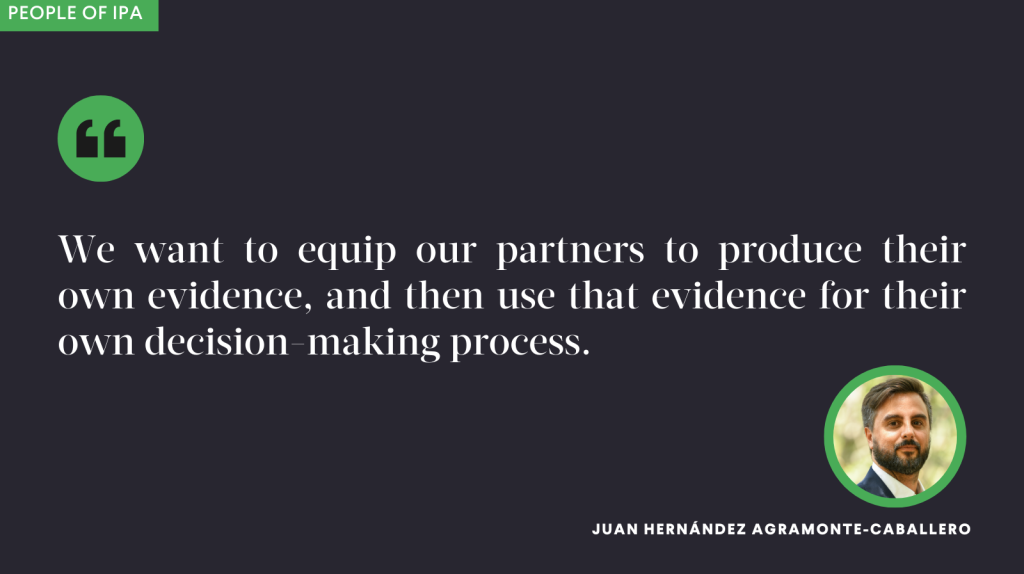Juan Manuel Hernández-Agramonte: We Want to Equip Our Partners
People of IPA is an ongoing series based on interviews with staff members as they reflect on their work, goals, and life experiences. Juan Manuel Hernández-Agramonte is IPA’s Senior Director of Embedded Labs.
“IPA is a place where you can grow as a professional,” says Juan.
He has seen it himself. Juan joined the organization as an intern. Now, thirteen years later, he is leading IPA’s Embedded Evidence Labs program.
Previously, Juan was the Regional Director for Latin America and the Caribbean for the last two years. He was responsible for directing its work across the entire region.
“I have to say that the experience has been amazing,” he says. “I’ve done many things with IPA, from visiting people participating in social protection programs in the most remote areas of the Andes mountains to understand their needs to working with policymakers in Central America and helping them with scaling up education programs.”
“It's been so diverse and so challenging that it has always been a growth process for me. I am always learning new things and developing new skills.”
With those demanding responsibilities comes deep trust from IPA’s leaders. Staff know that their ideas will be heard and valued.
“That’s something I find very interesting,” Juan says. “By collaborating with colleagues and stakeholders, you have the ability to contribute to the agenda for the region, to come up with new ways of doing things and there is an openness to this. I find it a very receptive environment for people who want to grow and who are passionate about what we do."

Rigor is one hallmark of IPA’s approach. Before creating interventions, the organization works with partners and other stakeholders to understand the conditions in which those ideas will come to life. “If you want to devise an effective policy,” says Juan, “you need to address the context and be sure that the policy can be delivered in that context.”
Juan remembers working with El Salvador’s government on a project for a neighborhood dominated by gangs. The goal is to support local caregivers in helping children to develop mentally and emotionally.
“For example, I visited a family’s home, and the grandmother was telling me that the children had to play just inside the door of the house. They can’t step outside to go to the park because it was dangerous,” Juan says. “People like caregivers must stay home and are not free to move around. They have to ask the gang’s permission to go to another neighborhood.”
Documenting such obstacles early helps partners make informed choices about projects at the development stage. It's one example of why Juan says understanding context clearly is “fundamental for creating good policy.”
In fact, that commitment to seeing the big picture is what drew him to IPA.
“I was very interested in the mission, bringing evidence to the process of decision-making in policy,” he recalls. “I had been working for organizations that were very motivated to address policy issues, but didn't have enough information to know whether they were doing the right thing or not.”
“I think IPA was filling that gap,” he says, with the organization effectively working with partners to, “‘Bring evidence for making better decisions and better investments into the decision-making process,’”
Juan sees IPA’s ability to support policy-making institutions on how to work with and produce evidence as one of its greatest assets.
“In our pursuit of sustainable impact at scale, we are keen on collaborating with governments, harnessing their capacity to reach millions and mobilize billions in resources.”, he says. “We are helping government partners to be equipped for using data and evidence through our Embedded labs program, supporting them in implementing more effective policies at scale.”
He cites examples including MineduLAB, the Innovation Lab of the Ministry of Education of Peru, and the Rwanda EdLab with the Ministry of Education of Rwanda.
As he takes on the role of overseeing IPA's embedded labs, he is eager to collaborate with governments, funders, and implementers to foster a culture centered around evidence-based decisions.
“The goal of the program isn't to produce evidence for them,” says Juan. “We want to equip our partners to produce their own evidence, and then use that evidence for their own decision-making process.”












